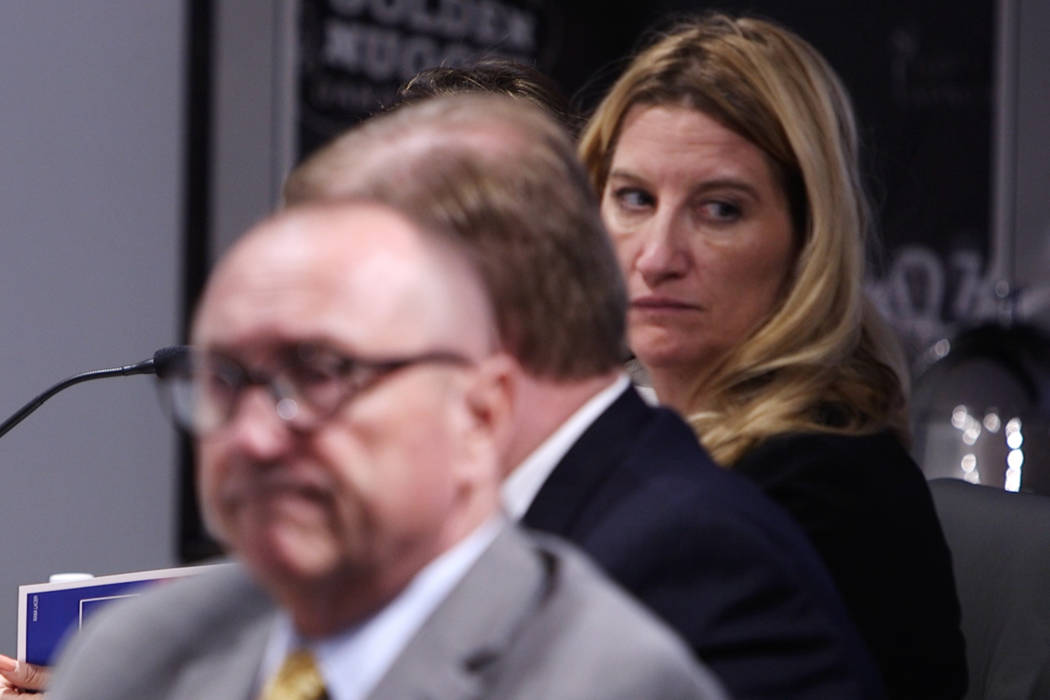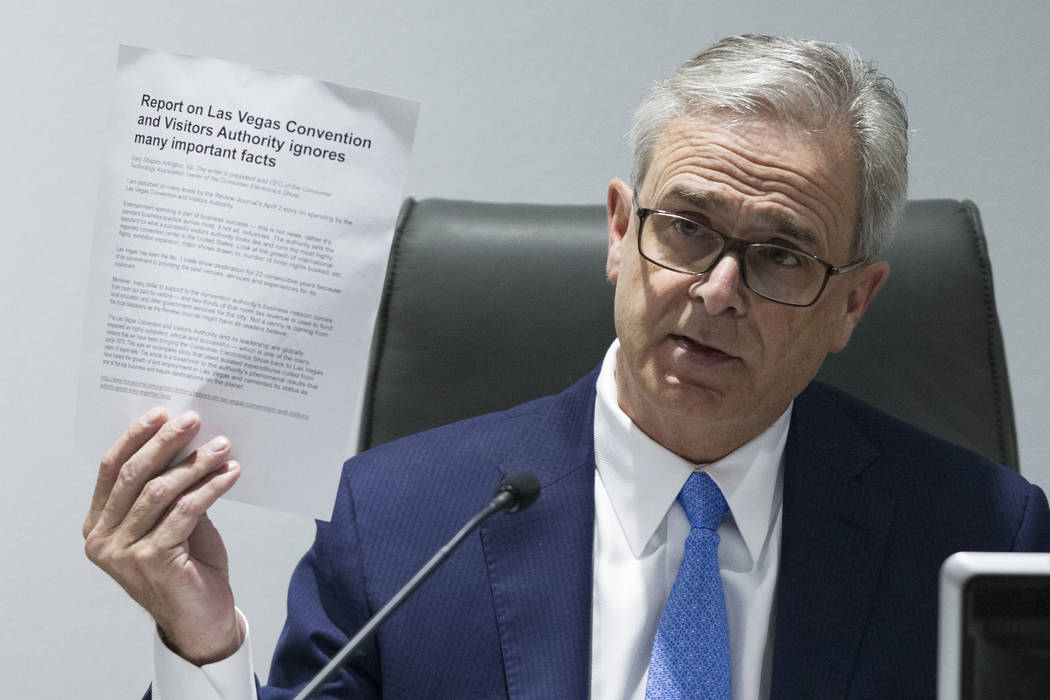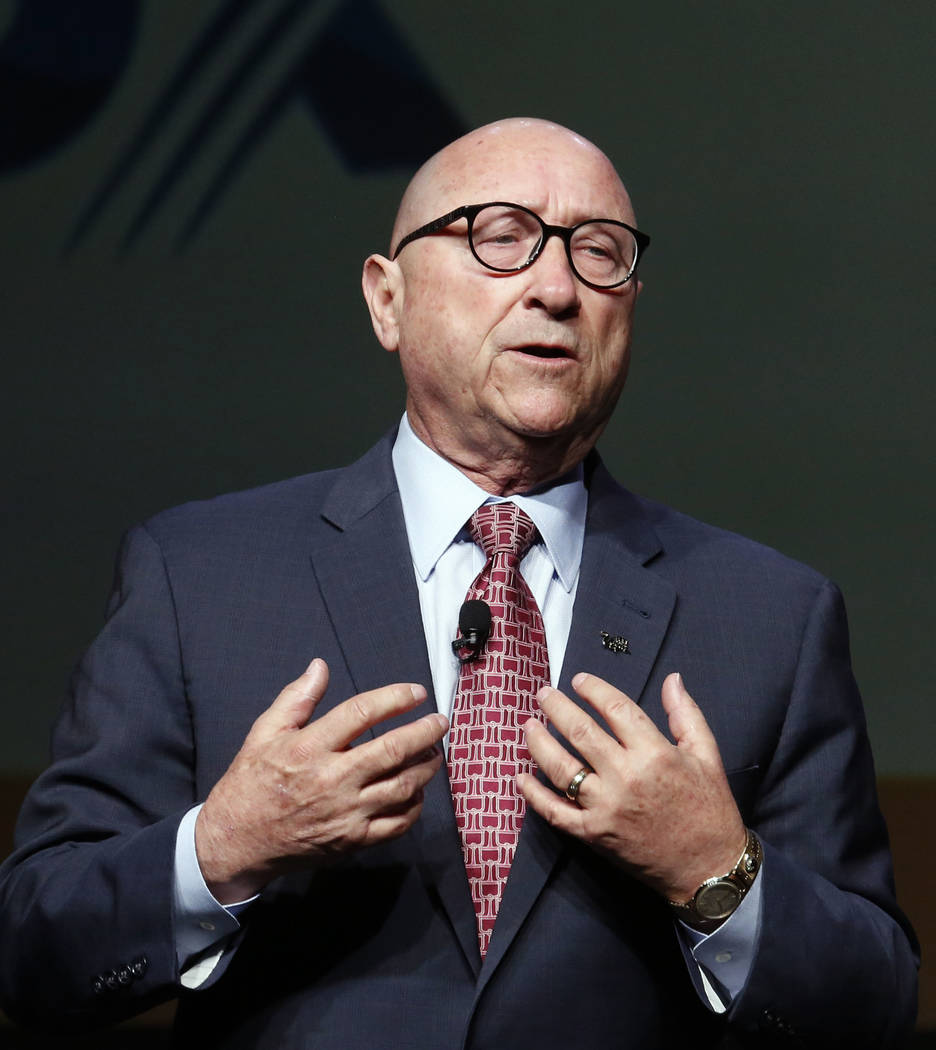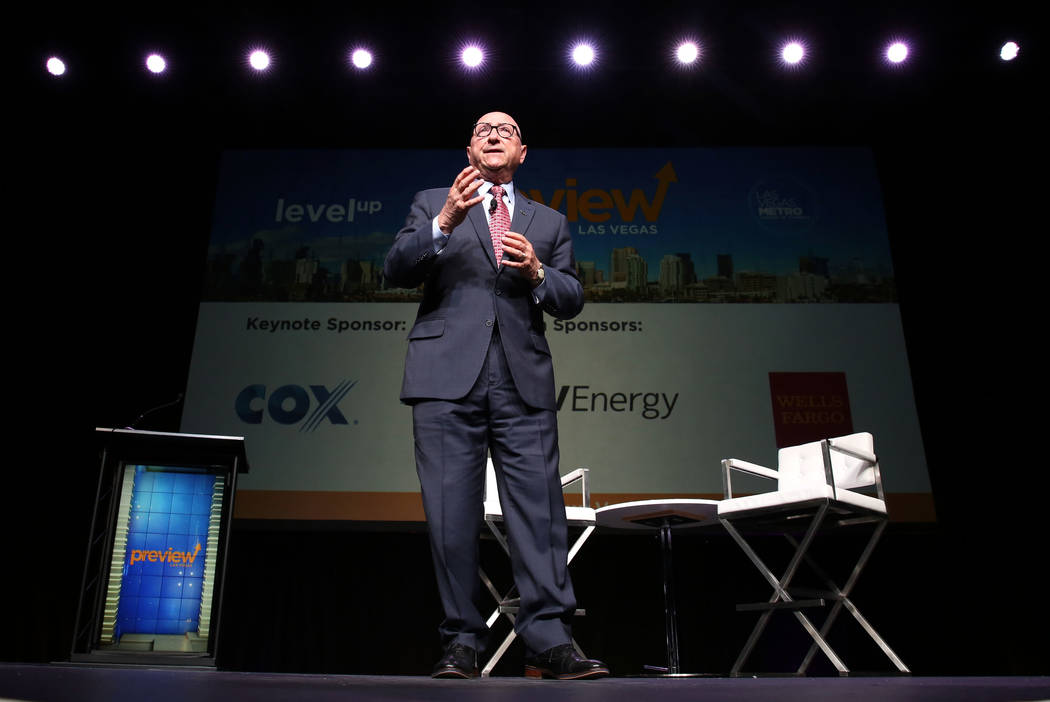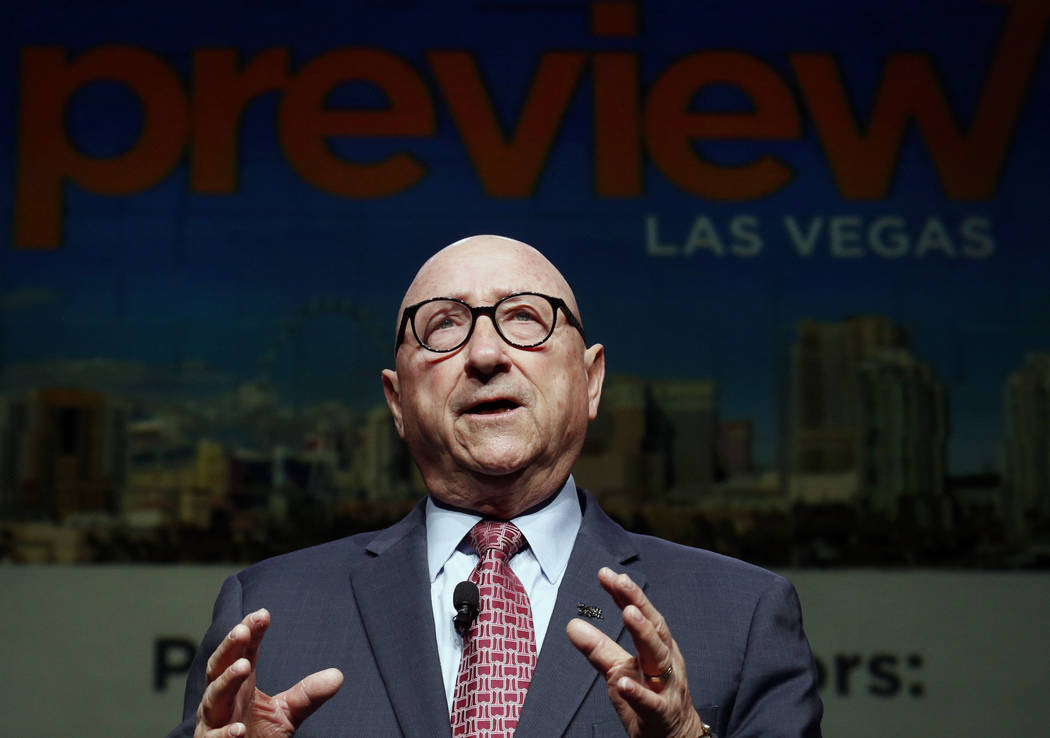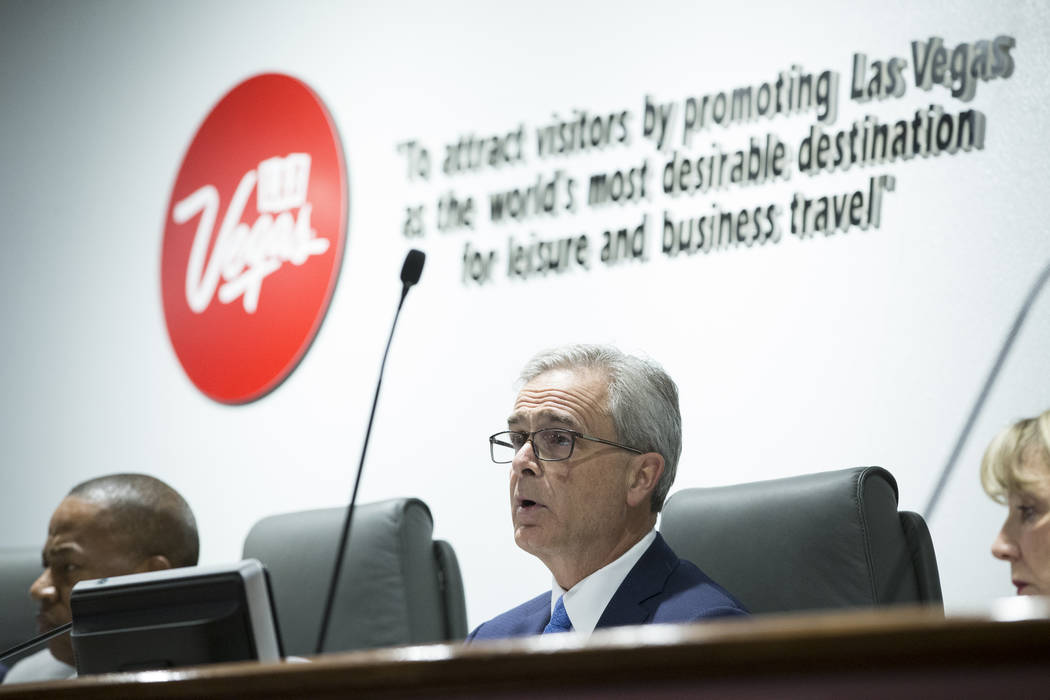LVCVA focused on damage control after RJ investigation, emails show
Las Vegas Convention and Visitors Authority executives, directors and contractors responded to a Review-Journal investigation last year by downplaying questions about agency spending and the independence of its board and by planning aggressive damage control.
A consultant hired by the agency recommended delving into the campaign donations of a key critic, Clark County Commission Chairman Steve Sisolak, now a Democratic candidate for governor, emails obtained by the Review-Journal show.
Authority President and CEO Rossi Ralenkotter later rejected the advice.
“A better response is to at least acknowledge that you’re looking into the issue,” said Eric Herzik, chairman of the political science department at the University of Nevada, Reno. “Then you can respond, ‘Here are errors in the story or here’s our interpretation of the story.’”
The emails show how the taxpayer-funded agency marshaled its massive resources before and after the April 2, 2017, publication of the story and sought guidance from high-powered public relations firms. The board members who oversee the agency were provided talking points to tout the importance of tourism.
The convention authority has an operating budget of about $251 million, funded mostly by hotel room taxes, and uses it to promote tourism and operate the Las Vegas Convention Center. The agency eventually accepted an accounting firm’s recommendations to cut some spending, primarily involving board members. One of the changes prohibited board members from receiving more than $400 in gifts each year from the authority and its business partners, and another limited directors to one agency-sponsored trip per year.
The Review-Journal story, based on more than 32,000 pages of receipts from authority executives over three fiscal years, revealed lavish spending on high-end entertainment, gifts for employees and first-class trips overseas for board members. Sisolak suggested in the story that the agency spend its money more efficiently and questioned whether board members had become too cozy with the authority staff.
Ralenkotter pressed ahead with the coordinated media campaign in an April 3, 2017, email to all 14 authority board members, eight of whom are elected officials.
“To this end, it is important we continue with our response plan and be aggressive in our reputation management efforts,” he wrote.
Ralenkotter defended the campaign in an interview this week, saying there was a lot of “brainstorming” to make sure board members and casino industry leaders were getting “accurate” information.
Agency executives kept the board’s vice chairman, Chuck Bowling, and other board members in the loop as the response to the story widened, emails show.
Bowling, president of Mandalay Bay, a MGM Resorts International company, asked for updates and received talking points stressing the benefits that tourism and the convention authority bring to the community. He used the talking points in a blistering attack on the investigation at a public board meeting days after it was published.
“As a member of the LVCVA board of directors, I routinely and properly engage with key staff for information and insights on many issues,” Bowling said in a statement Thursday. “Based on the facts, I believed this was an unwarranted attack on the reputation of the LVCVA and should be met with a strong defense.”
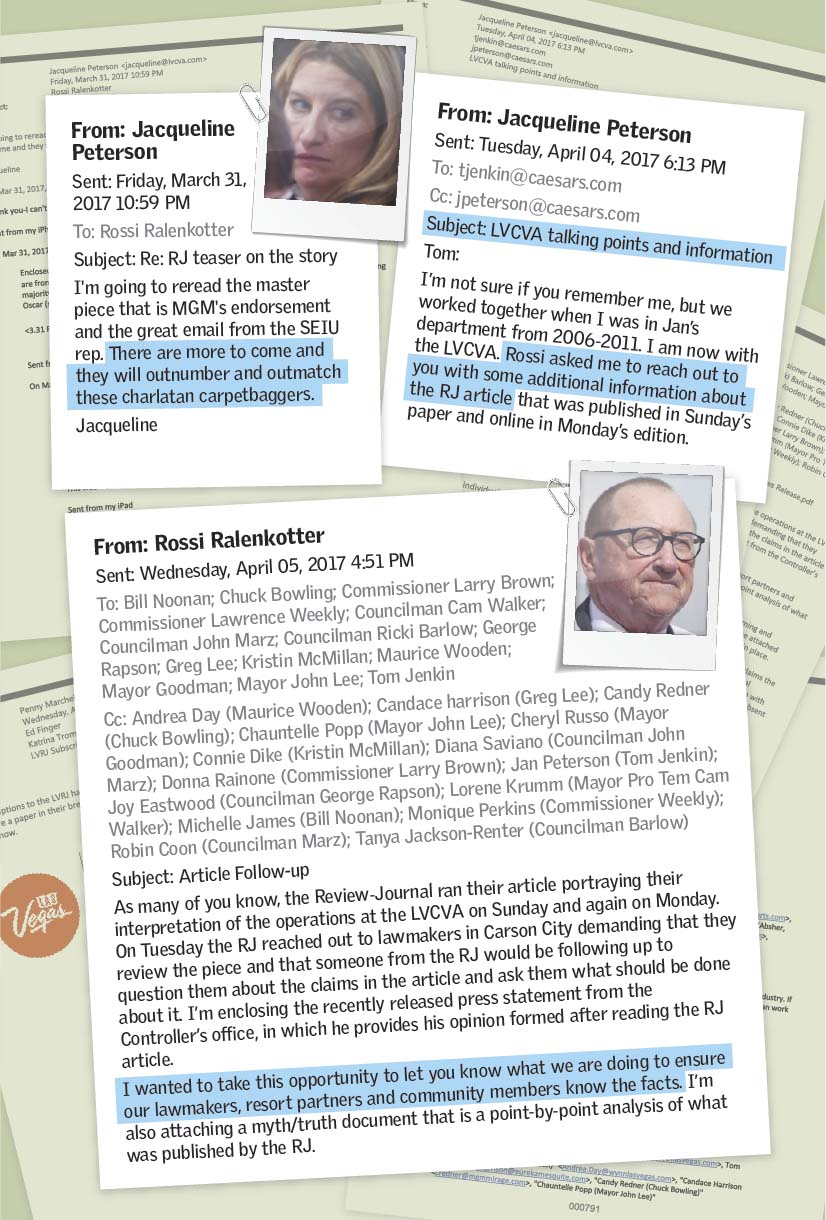
Oversight questioned
Curtis Kalin, a spokesman for the conservative watchdog group Citizens Against Government Waste in Washington, D.C., said the convention authority’s unified response suggests the relationship between the agency and its board members is too close.
“There’s a lot more looking out for each other than oversight here,” Kalin said. “They view it more as a political problem than trying to solve the problem.”
But Ralenkotter said he does not believe that Bowling and other board members have been compromised.
“That’s part of the normal responsibility of (dealing with) a board of directors — to get them information so they can make a decision on what they’re going to do,” he said. “It goes on all the time. They’re independent.”
The Sisolak angle surfaced in an April 2, 2017, email to Ralenkotter from a partner in High Lantern Group, a national public affairs company on the convention authority’s payroll. The partner, Clare Maher, suggested “having someone on your team find out the nature of campaign contributions from Sheldon Adelson to Commissioner Sisolak.”
Adelson, chairman and CEO of Las Vegas Sands Corp., and his family own the Review-Journal. Adelson has been a convention authority competitor and critic over the years.
“The Adelson family played no role in the Review-Journal’s investigation of the LVCVA,” Executive Editor Glenn Cook said Thursday. “The story was developed from tips that turned out to be true. The reporting speaks for itself, as do the spending reforms adopted by the LVCVA in response to our investigation.”
Adelson declined to comment through a spokesman.
It took Ralenkotter three weeks to dismiss Maher’s suggestion to examine Sisolak’s contributions from Adelson.
“This is not an activity the LVCVA would ever entertain, not for Commissioner Sisolak or any other politician,” Ralenkotter told Maher in an April 21, 2017, email. “The implication that an elected official would lash out at the LVCVA based on campaign donations is not appropriate dialogue to have with me or any member of my staff.”
In a statement this week, Maher said her written recommendation was “an offhand remark I made, amid a lot of other initial suggestions.” She said she did not discuss it again with Ralenkotter after he rejected it.
Ralenkotter said he waited three weeks because he wanted to put together a “very firm, targeted response that we would never do that. … Our job is to stay neutral when it comes to political issues.”
Sisolak said he was glad the convention authority abandoned the idea.
“It’s not a good use of public funds to be looking into the background of people that make comments about an agency,” he said.
State records show Adelson, his family members and companies contributed at least $60,000 to Sisolak’s County Commission re-election campaign in 2016. But the casino executive, so far, has not contributed to Sisolak’s campaign for governor. Instead, Adelson and his wife, Miriam, each have donated $10,000 to Sisolak’s Republican rival, Attorney General Adam Laxalt, records show.
“Sheldon Adelson has never influenced or attempted to influence my opinion on the spending habits of the LVCVA,” Sisolak said. “I was supportive at the time and continue to be supportive of accountability and transparency, and some people in the industry didn’t necessarily agree with my concerns.”
Herzik, the University of Nevada, Reno political science professor, said the internal convention authority emails, particularly messages targeting Sisolak, open up the authority to more scrutiny.
“You never put something like that in an email when you know the email might come up.”
Rallying support
In the days before and after the Review-Journal story, emails show, the convention authority mobilized its department heads and not only enlisted the help of High Lantern Group, but also R&R Partners, the politically connected advertising and public relations firm it pays roughly $96 million a year to promote Las Vegas.
Authority executives also reached out to legislative lobbyists, a public employee union leader and trade show and national tourism officials, emails show. Research and digital marketing experts at the agency participated as well.
Two Las Vegas law firms — Santoro Whitmire and Pisanelli Bice— billed the convention authority about $16,000 in fees for work related to the Review-Journal investigation, records show. The authority redacted most of what the firms did, citing attorney-client privilege. But one Santoro Whitmire invoice shows the firm consulted the authority’s legal counsel, Luke Puschnig, about public records requests from the Review-Journal. The firms did not return calls for comment.
The media response took shape at a meeting arranged by R&R Partners President Billy Vassiliadis several days before the story was published, emails show. He invited Ralenkotter and other executives from the authority and the advertising firm. The authority knew the story was coming because Ralenkotter was interviewed for it.
Vassiliadis said he recalled having a couple of meetings about the Review-Journal story with R&R and convention authority executives.
“They were basically meetings on how to deal with the PR (public relations) issues and fallout from the story and the messaging going forward,” he said, adding that he saw nothing wrong with providing talking points to board members.
“It’s important that we inform them of what the convention authority’s statement or response is going to be on whatever the issue of the day is,” he said. “These board members provide oversight, but they don’t live at the authority. It’s not the first thing they think about when they wake up in the morning and when they go to bed at night.”
Jacqueline Peterson, the authority’s communications director, was less diplomatic in emails about the newspaper story.
After praising a “masterpiece” endorsement the authority got from MGM Resorts, she wrote Ralenkotter: “There are more to come and they will outnumber and outmatch these charlatan carpetbaggers.”
In an interview this week, Peterson said she made that comment knowing that two of the three reporters who wrote the story were new to Las Vegas. She recalled that it took her a lot of time after coming to Las Vegas in 2006 to understand how vital tourism is to the economy.
Peterson’s enthusiasm for the campaign was apparent in another email to Nick Mattera, a digital marketer for the agency. She suggested that he find someone to post a tweet critical of the newspaper with an April Fools’ Day twist. One of her suggestions: “Must be @reviewjournal attempt at #AprilFools joke! #Las Vegas knows #LVCVA is vital to tourism & our economy!”
She said this week that she did not recall requesting such a tweet.
The emails show that Peterson and authority executives spent time monitoring the Twitter and Facebook traffic on the Review-Journal story and put out their messaging over the authority’s social media accounts.
One senior MGM Resorts official, Executive Vice President Alan Feldman, also played a role behind the scenes in the campaign.
In an email early on, High Lantern’s Maher informed Ralenkotter that Feldman had warned that the Review-Journal was preparing a “really ugly” story on the convention authority.
Feldman also had asked High Lantern to craft a response supporting the convention authority on behalf of MGM Resorts, Maher wrote in another email.
Feldman said in a statement this week: “You clearly were preparing a smear piece, one that had no balance whatsoever. As one of the largest members of the LVCVA, I was reaching out to their communications consultant to encourage them to respond aggressively.”
Contact Jeff German at jgerman@reviewjournal.com or 702-380-4564. Contact Arthur Kane at akane@reviewjournal.com or 702-383-0286. Contact Brian Joseph at bjoseph@reviewjournal.com or 702-387-5208. Follow @JGermanRJ, @ArthurMKane and @bjoseph1 on Twitter.



